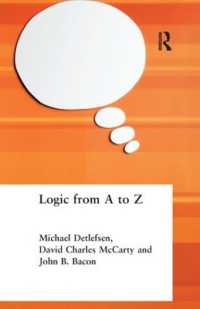基本説明
Produces a stringent critique of 'school effectiveness and improvement'.
Full Description
The drive to improve schools is high on governments' agenda but what do we want for our children? Is education about meeting new targets in, say, mathematics or management, or is it about developing socially responsible, creative and enthusiastic learners? Schools need to engage with issues of democratic citizenship, critical thinking, creativity and community - achievement in the widest sense. The young need schools which make each of them welcome, and which embody hope for a better future, an experience of democratic interaction, and a vision of social justice. This book produces a stringent critique of "school effectiveness and improvement", and draws on curriculum, learning, intelligence, community, equality and inclusion, to offer a new vision of school development, with inspiring examples from across the world.







